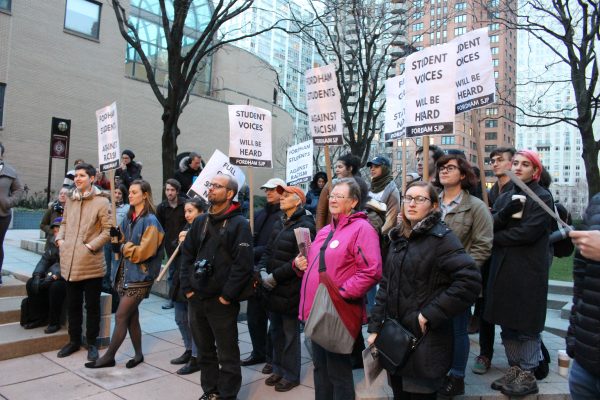Fordham Failing at Free Speech, FIRE Says
March 14, 2017
Following controversy at Fordham College at Lincoln Center over the school’s decision to reject a Students for Justice in Palestine (SJP) club approval, the Foundation for Individual Rights in Education (FIRE) has named the school among its “Ten Worst Colleges for Free Speech,” for the first time.
According to its website, FIRE is a nonprofit group which works to “defend and sustain individual rights at America’s colleges and universities… which include freedom of speech, legal equality, due process, religious liberty, and sanctity of conscience–the essential qualities of individual liberty and dignity.” They have published a “10 Worst Colleges for Free Speech” each year since 2011, and are staffed by professors, policy experts and “public intellectuals.”
Listed in no particular order, Fordham University was included along with schools such as Northern Michigan University, for threatening students with disciplinary action for discussing “suicidal or self-destructive thoughts or actions with other students,” the University of Oregon, for intervention with a student newspaper and punishment brought down on a professor who wore blackface during a private Halloween party; Georgetown University, for informing a group of Bernie Sanders supporters that “campus was no place for talking to fellow students about their chosen candidate,” and Harvard University, for “blacklisting” members of off-campus single-gender organizations.
FIRE points to Dean of Students Keith Eldredge’s decision not to allow SJP to become a club as an example of particularly “persistent and brazen” “viewpoint-discriminatory” actions by the school. After nonprofit Palestine Legal publicized the decision and Eldredge’s reasoning, FIRE and the National Coalition Against Censorship (NCAC) sent a letter to Fordham demanding that the university recognize SJP and accusing the school of straying from its stated commitments to free expression on campus. Fordham has continued to stand by the decision and has sanctioned SJP organizer Sapphira Lurie, FCLC ’17, on charges of violating “University regulations pertaining to the Demonstration Policy” in relation to an unauthorized rally. Her hearing came under fire after Eldredge decreed that it could only be a closed-door meeting, and ultimately her sanction was decided without a hearing.
The school is accused of “persistent refusal to live up to the promises it makes to its students.”
Eldredge said of the list, “I think [FIRE has] a motive to get the headlines. I would disagree with their assessment but they have the right to their opinion and the right to make that statement. I didn’t think it was proportionate to the incident, personally.”
“At this point I feel like we’ve given a decision and responded to inquiries about the decision,” Eldredge said. “The decision was made that what [SJP] initially presented was not going to be approved and so coming back with the exact same thing is probably going to get a similar answer.”
“I’m certainly willing to continue conversation about SJP whether it’s the students who requested the club or other students that are concerned about Palestinian issues or issues going on in Israel,” he continued.
According to Facebook events, SJP will be holding two open meetings in coming weeks entitled “[Boycotts, Divestment and Sanctions] (BDS) at Universities” and “United States Imperialism, Palestinian Resistance.” Eldredge explained that they were allowed to hold events as long as they were authorized, saying, “Certainly if a group wants to have a demonstration or a rally or an event on campus, as long as they follow the procedures that are outlined like in the demonstration policy, the focus there is really on time, place and manner, not on content.”
The original version of this article misstated the full name of SJP. It has been updated to reflect the correct information.













